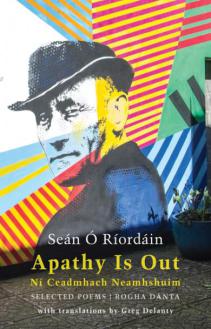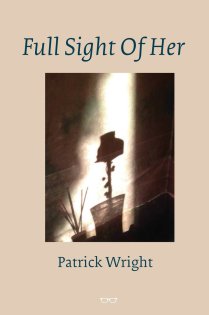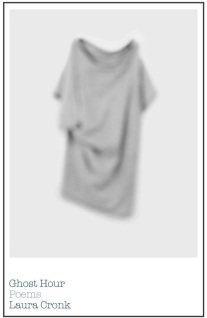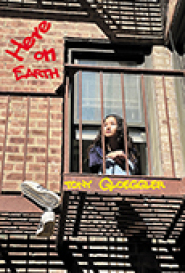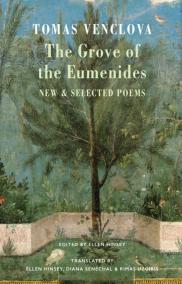
Seán Ó Ríordáin,
Apathy is Out: Selected Poems,
Bloodaxe Books, 2021.
ISBN 978-1-78037-536-6. 171pp. £12.99.
Greg Delanty and Bloodaxe are to be congratulated for making this bi-lingual selection available for English speaking readers. It has been a long labour for Delanty but clearly one propelled by love and dedication. He began working on the translations back in 2002 with the help of Liam O Muirthile who provided him with cribs to get him started over an initial three year period. Delanty does make the somewhat alarming admission in his Preface that “my Irish is poor” but perhaps one should assume that this is false modesty and that his Irish improved through the process of translating the poems.
Apathy Is Out is not the first Ó Rîordáin Selected Poems to appear. A bilingual edition was published in 2019 from Yale University Press edited by Frank Sewell with translations by different contributors. However the Bloodaxe edition is distinguished by being the work of solely one translator. I would imagine it will hold that distinction for some time to come and remain the best available introduction to Ó Rîordáin’s work for English speaking readers.
Although the collection is billed as Selected Poems it does in fact represent the bulk of Ó Rîordáin’s oeuvre. He was not a prolific poet. This might in some people’s eyes rob him of greatness but it is possible to gain a highly acclaimed reputation with a modest output. Philip Larkin and Elizabeth Bishop spring to mind in this respect. In Ó Rîordáin’s case his productivity was inhibited by a lack of confidence which was the result of a dismissive view of his work by the literary establishment of the time, the 1950s and early 1960s, primarily it would seem because his prosody was Modernist and too rooted in the vernacular. That he later gained cult status was perhaps inhibiting too, in a different way, as it put him beyond considerations of critical judgement by his followers.
That Sean Ó Rîordáin is not very well known outside Ireland is perhaps inevitable given that he elected to write solely in the Irish language. There are an estimated 1.2 million Irish language speakers in the world, the majority of whom live in Ireland, in comparison to 1.35 billion people worldwide who speak English (though admittedly in both demographics the percentage of people who actually read poetry is small). This is a huge potential readership and explains why major Irish poets who wrote in English, like Yeats and Heaney, achieved international status. This would not have been open to them if they had written in Irish. Sean Ó Rîordáin’s decision to be solely an Irish language poet is an integral aspect of who he was, reflective of a personal need to fully embrace a national identity.
With any book of translations, the skill of the translator is as much the story as the work of the writer being translated. Furthermore, underlying this is the perennial issue of the difficulty of translation as a process in itself, particularly with regard to poetry. Greg Delanty identifies why this is so from the outset in the preface, where he says “poetry in all languages is a kind of language unto itself.” Purists will seize upon this to declare that all attempts to translate poetry are bound to fail. A further turn of the screw is given by the view that Ó Rîordáin’s poetry in itself is untranslatable. However for readers who are not fluent in other languages there is no other choice but to read poetry in translation. Furthermore, the translation has to be accepted almost solely on trust. The deciding factor for me, and this is where I differ from the purists, is how well the translated poem reads. Does it stand up to analysis as a poem in its own right and afford the same satisfactions as a poem written in English?
The poems in this collection certainly excel these basic considerations. They read very well indeed. This is perhaps not surprising as Greg Delanty is an award winning poet of long standing. The dangers of sounding stilted, or producing an awkward register that is the hallmark of a poor translation, are deftly avoided while an approximation of Ó Rîordáin’s characteristic lucid, idiomatic discourse is seamlessly realised. One has to look no further than the title poem, which is probably the single one that Ó Rîordáin is best known for, to find all the qualities that make him a poet worthy of regard. The poem possesses a magnificent rhetorical power, all the more effective for its pared back, restrained language. It has contemporary force too in a climate where right wing propaganda fuels hostility to immigrants, offering an eloquent rebuttal of the “citizens of nowhere” jibe: ‘there’s not a single spot anywhere/we’re not a part of. We issue from everywhere.’
Ó Rîordáin’s poems tend to be quietly reflective and ruminative, some almost bordering on the aphoristic but not exclusively so. For instance there is the ballad like Mount Melleray, a tour de force of 22 quatrains with scintillating images such as “joy a lilting jig in the air” and “A splash of light poured slowly/through the beehive of a window”, demonstrating that Ó Rîordáin was a poet of considerable invention. Moreover there is the propulsive energy to be found in Freedom (Saoirse) which has been likened to Beat poetry. That this poem has been adapted into a song by the Irish language folk band The Gloaming comes as no surprise for it fairly sings on the page. Ó Rîordáin’s reputation will I am sure continue to grow through these translations in a renewal that echoes these resonant lines from Footprints (Rian nag Cos): ‘I die with every word,/but I rise with every breath’.
David Mark Williams
To order this book click here
David Mark Williams writes poetry and short fiction. He has two collections of poetry published: The Odd Sock Exchange (Cinnamon, 2015) and Papaya Fantasia (Hedgehog, 2018). For more information go to www.davidmarkwilliams.co.uk
Patrick Wright, Full Sight of Her,
Eyewear Publishing, 2020.
ISBN 9 781913606046. 104pp.£10.99.
Wright’s heart-wrenching, harrowing account of passion, love, disintegration, death and mourning is not an easy read. The emotion on every page is visceral, the poet’s repeated reaching for ‘a valium’ to cope with the experiences he records can leave the reader feeling their own need for analgesia when reading the hundred plus pages of this debut collection. In Full Sight of Her we are introduced to the poet’s partner Kim, whose life he celebrates and whose death he grieves. ‘This grief has yet to happen,’ he explains, but it is there on every page.
The deaths of other family members, especially his ‘Nan’, offer a variety of insights, and some relief from the intensity of the love poems. The collection oscillates between prose poetry and lineated verse, culminating in dated entries to the final week of Kim’s life which have almost the effect of a blog or a medical record. The claustrophobic sickrooms where he watches as she sleeps (sometimes morphine-induced), open up from time to time to memories of seaside trips (echoes of which surface in phrases such as ‘surgeons are seabirds’), and ‘recession-hit Southport with its
… closed-down
amusement park, fenced off,
rides stopped, arcade machines unplugged.
Kim’s own creativity is recalled with references to her work as photographer: the ‘darkroom of her mind’ is explored, and the collection illustrated with examples of her artistic portfolio –allusive, ambiguous images, slightly blurry as if viewed through tears.
Milton’s ‘Sonnet 23’, from which the collection takes its title, provides the context for the psychological, spiritual and emotional reach of these poems here. Grieving, the poet trusts to have ‘Full sight of her in Heaven without restraint’, reminding his reader that religion may offer some comfort, which is hinted at in Wright’s verse. But this is a hard-won solace, and cannot be relied on: ‘Forsaken by Christ, your book of psalms/were no longer read; the festered in your dresser.’
The haunting final couplet of Milton’s sonnet reinforces the living death of bereavement; how you live with the ghosts that visit like revenants in snatched dreams: ‘But Oh! As to embrace me she inclin’d,/I wak’d, she fled, and day brought back my night.’
In Wright’s collection, dreams convey the full poignancy of waking state, the aloneness, the unbearable state of being ‘a widower, prizing thumbnails.’ Wright records how
‘I slept on problems, no web access or walk throughs,
let my psyche be the house,
my dream be the labyrinth, my self be the haunting.’
Wright’s collection is dark. There are moments of tenderness, passion, shared memories of vibrantly lived and shared life. He conveys effectively small acts of physical intimacy such as combing her hair, saying ‘goodbye to your breasts, goodbye/to your legs, goodbye mons pubis.’
In the aptly named ‘Martyrs to each other’ the refrain ‘now the treatments have passed’ acts as a reminder of the spiritual healing that may be offered by conventional religion. Can this be achieved? In stunning lines, the poet suggests both he and his dying partner can become Christ-like figures. Her death is his crucifixion, anointed for death as in the gospel accounts of Mary Magdalene’s ministry to her Lord: ‘I’ll be your Christ when you lend me your balm’. There is a resurrection of sorts: ‘My kiss lives on your forehead'. But the overwhelming message is one of human desolation not consolation: ‘My love, you’ll be my Christ. I’ll wear the scar.’
There is, says Wright, ‘no concealment between lovers.’ It feels as if he withholds nothing from his reader, either.
Hannah Stone
To order this book click here
Hannah Stone is the author of Lodestone (Stairwell Books, 2016), Missing Miles (Indigo Dream Publishing, 2017), Swn y Morloi (Maytree Press, 2019) and several collaborations, including Fit to Bust with Pamela Scobie (Runcible Spoon, 2020). She convenes the poets/composers forum for Leeds Lieder, curates Nowt but Verse for Leeds Library, is poet-theologian in Virtual Residence for Leeds Church Institute and editor of the literary journal Dream Catcher. Contact her on hannahstone14@hotmail.com for readings, workshops or book purchases.
Laura Cronk, Ghost Hour,
Persea Books, 2020.
ISBN: 978-0-89255-519-2.
96pp. $15.95.
In “As Made,” the long, eighteen-page poem at the center of Laura Cronk’s Ghost Hour, she writes
Our young selves are gone, as much
as anyone or anything
that has ever lived is gone.
Which is to say never over.
How like Faulkner’s observation in Requiem for a Nun, “The past is never dead. It’s not even past.” Indeed, Ghost Hour is all about the ghosts we drag around with us our whole lives, our former selves that shadow us every day. The poems in Part One address “the beginning”: two are entitled “Ancestry,” three “Before,” and they trace the poet’s sense of her identity back to childhood, as if some elemental formative conditions and experiences have set the rest of our lives in motion; how we will react to history and experience for the remainder of our conscious existence. This sense of basic forces at work is expressed so powerfully in the poem, “Witching Hour,” which begins:
The dirt and grass
and maple trees and scrub trees
and day lilies and clover
and the dew
that bathes them
and the clay
beneath the dirt
and the water
beneath the clay –
On deep summer nights,
these elements,
in counsel with each other
decide to share
their power with the children.
You can feel how “of the earth” small, impressionable children are, as they are being formed for future lives, day lilies indeed, nurtured by the water that sustains them, the events, the memories. The two “Ancestry” poems mention an “Appalachian cabinetmaker,” her grandfather, who is part of the equation, the implicit shame of the possibility of his being a member of the Ku Klux Klan and participating in lynchings. “I resisted knowing,” she confesses. You can feel her agonizing over her role, her “inherited” responsibility. The poem ends:
If he marched. If he didn’t
disagree. If his thoughts
were the rope and the tree.
If I was raised to protect
the rope and the tree.
Like the sprawling central poem, “As Made,” which involves the memory of a first love with a boy who is gay (“We were made / for each other”), though neither realizes it at the time (“You tried to come out to me”), another poem, from the first section, “Mixed Class,” recounts her life growing up as a nerdy student, one of the “marching band dorks,” the “quiz-bowl geeks,” who “worked at the gas station, / or Hardees, mowed grass,” went out for dramatic productions at school:
A reason to sign up
to do the play
was to have someone else’s
words to say.
It’s a picture of innocent, as yet unformed kids in a small town just starting to become aware of themselves, of their bodies, taking on identities. The first section ends with a long prose poem, “Dear Autobiography,” but it’s written from the perspective of middle-age, “holding this paper in my forty-year old hands.” She reflects:
It was so confusing then to have just broken out of the chrysalis of childhood, to be in our adult bodies, knowing nothing….
Just so, she observes in “As Made”:
We were friends
and our friends were all friends
You were funny and nerdy and
athletic and cute.
We went bowling, went to the movies.
We joined everything all together,
not just community theater but science club,
the speech team, youth groups,
marching band.
All of this memory is a sort of prelude or preparation for Part Three, where the bulk of the collection, two thirds of the poems, flower like the day lilies. The poem, “Dusk,” from this final section, sums up the trajectory, the back-and-forth of our lives which contain all that went before as we move ineluctably forward.
Look, the shoes
I wore when I was ten
are on my feet again….
Dusk is the ghost hour of the title, the time of change and reflection.
A truckload of yearning
is dropped at my door
each dusk.
What is life, after all, if not an accumulation of regrets, missed opportunities, a longing for all of the do-overs that can never happen?
In the ghost hour
when everything
that’s lost
or gone
is really gone,
I want a drink.
But, of course, it’s never really gone.
Still, the present is pretty good, too. In Part Three, Cronk writes touching, amusing poems about her marriage – “Like a Cat” (“You want a dog / but you are like a cat, / though you hate cats….”), “The Sculptor,” “On Choosing You,” “Portrait of the Summer Husband.” The short poem, “Marriage,” is clever and wise:
Neither nickeled nor dimed
Neither paid nor fined
Neither wined nor dined
Neither free nor rhymed
Neither bird nor vine
Neither leaf nor spine
Neither cruel nor kind
Neither yours nor mine.
A life intertwined, a life so sublime, in the cradle of time!
Cronk also writes about her motherhood and her life in Jersey City, New Jersey. “Garden of Earthly Delights” makes that life sound appealing, teeming with little satisfactions, unthreatening and neighborly. Tellingly, the poem ends with the observation:
We watch
the children playing
in the bath
of evening air
in this city
of their first memories.
And so the cycle begins for a different generation. This is where they will merge with and emerge from their own dirt and grass, day lilies themselves. Ghost Hour is lyrical and thoughtful, worth reading over again.
Charles Rammelkamp
To order this book click here
Charles Rammelkamp is Prose Editor for BrickHouse Books in Baltimore, where he lives, and edits The Potomac, an online literary journal. http://thepotomacjournal.com. His photographs, poetry and fiction have appeared in many literary journals. His latest book is a collection of poems called Mata Hari: Eye of the Day (Apprentice House, Loyola University), and another poetry collection, American Zeitgeist, is forthcoming from Apprentice House.
